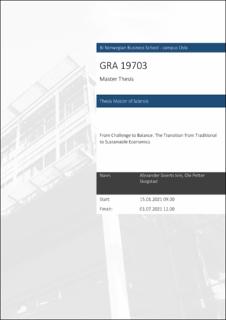From Challenge to Balance: The Transition from Traditional to Sustainable Economics
Master thesis
Permanent lenke
https://hdl.handle.net/11250/2826757Utgivelsesdato
2021Metadata
Vis full innførselSamlinger
- Master of Science [1621]
Sammendrag
The subject of this master thesis is the concept of a circular economy as a
sustainable economic model, and how it fits traditional economics developed in
the 19th century. The subject is discussed with a nuanced and holistic approach
from an economics perspective, attempting to describe why a sustainable
economic model is necessary, and how a successful transition may find place. The
thesis is meant as a contribution to the existing research on the field.
The traditional linear economic model is still the dominating model today. It has
been the foundation for substantial wealth-creation over the last centuries,
however it seems to fail in incorporating environmental concerns. The thesis
explores how rethinking and reconstructing our economic models from the linear
approach to a circular economy can in fact maintain value creation and economic
growth, while minimizing the climate footprint left on our planet. The circular
economy bears the potential to increase the duration and quality of goods and
services produced as well as reduce residual waste, by incorporating the
environment and planetary boundaries as constraints. The earth is a closed loop
system with limited resources and resilience, and our economic models and
behavior should reflect this.
Google Scholar is utilized to establish a foundation of existing literature on
circular economy and supplements with relevant theory on welfare economics and
network effects. Economic theory dictates that scarce resources are to be utilized
at full capacity, maximizing the output from these scarce resources. However, the
established linear economic model proves the opposite. Resources are not utilized
to their full potential, accommodating for collective mass production and overconsumption.
The thesis proposes how identifying categorical barriers obstructing
the transition to a circular economy and strategically use the quantified barriers as
a tool in policy-setting, can in fact initiate a constructive transition toward a
circular economy. Theory on welfare economics and network effects are utilized
to illustrate how deflating the barriers through legislation can enable the market
forces to stabilize the market in a circular economy, by establishing strategic
incentives to induce the successful transition toward the sustainable economic
model – the circular economy.
Beskrivelse
Masteroppgave(MSc) in Master of Science in Business, Economics - Handelshøyskolen BI, 2021
